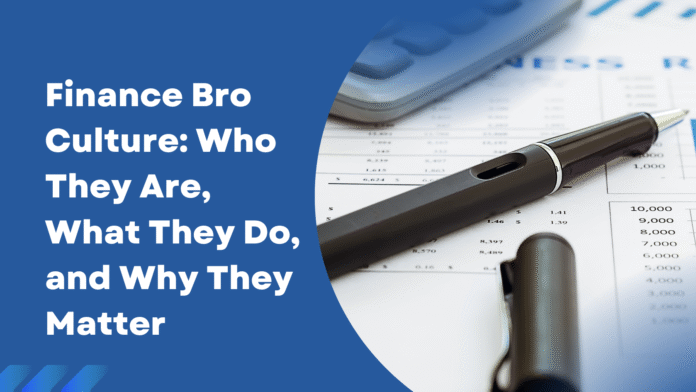In today’s fast-paced, money-obsessed world, one subculture has gained a reputation that is both infamous and influential: the “Finance Bro.” Whether you spot them chugging cold brew on Wall Street or breaking down stock valuations on TikTok, finance bros are everywhere — shaping corporate culture, financial markets, and even internet memes.
But who exactly is a finance bro, and why are they such a hot topic in both professional circles and pop culture?
Who (or What) Is a Finance Bro?
A “finance bro” is a stereotype — but a popular one. Generally, the term refers to young, ambitious, mostly male professionals working in finance-related sectors like investment banking, private equity, hedge funds, or wealth management.
They’re typically:
- Dressed in Patagonia vests, slim-fit chinos, and loafers without socks
- Obsessed with Excel shortcuts and Bloomberg terminals
- Fluent in terms like “IRR,” “YOLO trades,” and “alpha”
- Regulars at Equinox gym and Sweetgreen salads
- Addicted to caffeine, crypto, and CNBC
While the label began as a tongue-in-cheek critique, it has evolved into a real identity embraced by some and mocked by others.
Where Did Finance Bro Culture Start?
Finance bro culture has roots in the Wall Street boom of the 1980s, when high salaries and aggressive deal-making created a hyper-competitive, male-dominated workplace. Over time, Hollywood movies like The Wolf of Wall Street and Boiler Room cemented this image in the public consciousness.
As the finance world became more accessible and internet-savvy, the finance bro stereotype evolved. Now, finance bros aren’t just in boardrooms — they’re on YouTube explaining options trading or tweeting charts on meme stocks.
What Do Finance Bros Actually Do?
The day-to-day life of a finance bro depends on his specific role, but common jobs include:
1. Investment Banking Analyst
- Works 80-100 hours/week
- Builds pitch decks and financial models
- Helps companies raise capital or merge with others
2. Private Equity Associate
- Analyzes acquisition targets
- Manages portfolio companies
- Works closely with CEOs and financial data
3. Hedge Fund Trader
- Buys and sells financial instruments for short-term or long-term gain
- Lives by market trends and technical analysis
4. Wealth Manager or Financial Advisor
- Manages money for high-net-worth individuals
- Develops long-term financial plans
Despite the glamorous perception, the finance bro life is not all Ferraris and fat bonuses — it’s long hours, tight deadlines, and high stress. That’s why so many burn out or pivot to tech or entrepreneurship.
Finance Bro Slang You Should Know
To really understand finance bros, you need to understand how they speak:
| Term | Meaning |
|---|---|
| YOLO Trade | High-risk investment made on impulse |
| Alpha | Outperformance vs. the market |
| Beta | Measure of a stock’s volatility |
| Dry Powder | Cash reserves ready for investment |
| 10-K | Annual report filed with the SEC |
| Carry | Profit share in private equity or hedge fund deals |
Finance Bro on Social Media
Modern finance bros have taken their hustle online. Platforms like:
- TikTok – “StockTok” bros share trading advice, often with questionable accuracy.
- Instagram – Flexing watches, Teslas, and 6 AM gym sessions.
- Reddit (r/WallStreetBets) – A mix of gambling, memes, and market mayhem.
Some finance bros use their platforms responsibly to educate, while others perpetuate misinformation or promote “get-rich-quick” schemes.
The Pros and Cons of Finance Bro Culture
✅ Pros:
- Highly ambitious and hardworking
- Financially literate (often self-taught)
- Quick decision-makers
- Strong networking skills
❌ Cons:
- Can be elitist or arrogant
- Burnout-prone
- Often male-dominated and lacking diversity
- Sometimes blur the line between hustle and hype
Are Finance Bros Changing?
Yes — and that’s a good thing.
The new generation of finance professionals is more inclusive, tech-savvy, and socially aware. Many are replacing the “bro” culture with values like transparency, work-life balance, and ESG (Environmental, Social, and Governance) investing.
Still, the finance bro image endures — partly because it’s entertaining, and partly because it reflects the reality of a sector that’s long valued prestige, performance, and profit.
Final Thoughts: Is Being a Finance Bro All That Bad?
Not necessarily. Like most stereotypes, the “finance bro” label only scratches the surface. Many finance professionals are thoughtful, diverse, and purpose-driven. The important thing is to separate the meme from the mission — and recognize the industry’s need for continuous evolution.
If you’re eyeing a career in finance, just remember: the Patagonia vest is optional, but the grind is not.




